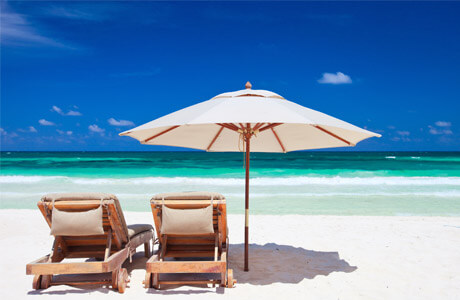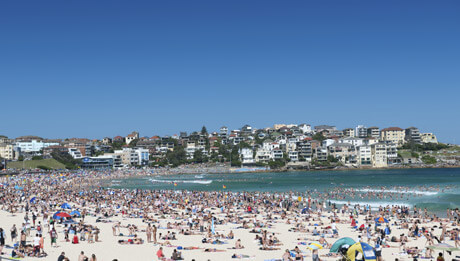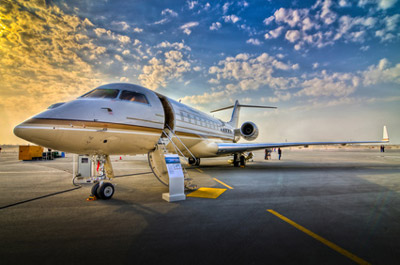Types of travellers
Holidaymakers
 These people will travel to a holiday destination for a typical resort holiday. Many travel to European resorts in Mediterranean countries like Spain, Italy or Greece in search of the sun or to France and Switzerland on skiing holidays.
These people will travel to a holiday destination for a typical resort holiday. Many travel to European resorts in Mediterranean countries like Spain, Italy or Greece in search of the sun or to France and Switzerland on skiing holidays.
Others may travel a bit further to Florida in the USA or a Caribbean resort and some of the more adventurous will even travel to more exotic locations such as Kenya in East Africa or Thailand in South East Asia. Some will even venture as far as Australia for their holidays.
Because these travellers are going to a holiday resort with a hotel with all the comforts of home, they will usually have easy access to medical facilities should they be required, and therefore, they should be able to obtain any medicines they require from a local pharmacy or medical facility.
These travellers usually remain within easy reach of a doctor or a hospital whilst they are away which is a much better option than self medication for serious illnesses. They may also include children, the elderly, pregnant women and the disabled who should all seek medical assistance if they become ill.
 However, a small medical kit for treating minor ailments should they arise will be of great value and convenience. The information supplied in this site will also prove valuable to these travellers and the interactive page can also provide a list of the medicines they should take with them.
However, a small medical kit for treating minor ailments should they arise will be of great value and convenience. The information supplied in this site will also prove valuable to these travellers and the interactive page can also provide a list of the medicines they should take with them.
Vaccinations take time. A doctor or nurse should be consulted as soon as possible, ideally at least four weeks before travelling. Late bookings can leave insufficient time for vaccinations to become fully effective.
Stomach upsets and diarrhoea are very common. Contaminated food and water is a major cause of illness and care is especially important when eating out and in countries where local hygiene is poor. More spices or oil in food as well as alcohol can also lead to stomach upsets.
Sunburn is preventable, so always use an appropriate sunscreen when going outside into the sun. See the sunburn page for more details.
Business Travellers
 This group of travellers for the main part fall into the same category as the previous group in so far as they are never far from medical assistance when it is required. The main difference being that the majority will be travelling to cities rather than holiday resorts. A small group however, will occasionally travel to more remote areas in the course of their business. In this instance, a small medical kit for treating minor ailments will be of great value and convenience. The information supplied in this site will also prove valuable to these travellers.
This group of travellers for the main part fall into the same category as the previous group in so far as they are never far from medical assistance when it is required. The main difference being that the majority will be travelling to cities rather than holiday resorts. A small group however, will occasionally travel to more remote areas in the course of their business. In this instance, a small medical kit for treating minor ailments will be of great value and convenience. The information supplied in this site will also prove valuable to these travellers.
Tiredness and jet lag may affect your business efficiency. Rest before and after travel is important. Persons with occupations which involve frequent travelling should consider vaccinating in anticipation of overseas assignments in order that the vaccinations achieve optimum protection, e.g. a first yellow fever vaccination certificate is not valid for 10 days.
Contaminated food and water is a major cause of illness in business travellers although less so if eating and drinking is confined to first class hotels. Avoiding unsafe food and water can sometimes be difficult, when being entertained by enthusiastic hosts, unless a strategy is planned in advance!
It may be wise to always carry an anti-diarrhoeal preparation to make sure that you are able to attend important business meetings or to help you make long journeys without having to make frequent and inconvenient use of the toilet.
Unfamiliar surroundings, especially when combined with excessive alcohol consumption can lead to uncharacteristic behaviour including sexual risk taking. "Unsafe" sex, particularly with commercial sex workers, may pose serious infections risks including HIV.
Backpackers & Adventure Travellers
This group includes those who travel alone or in small groups on self-organised trips, and includes; trekkers, mountaineers, climbers, bikers, canoeists, scuba divers, etc. etc. The list is endless. This type of excursion usually involves travelling on foot or public transport and staying in simple cheap accommodation. This can expose travellers to additional health risks and it is this group of travellers who will probably benefit the most from taking their own customized medical kit with them.
Vaccinations should be arranged with the doctor or nurse as soon as possible, ideally at least six weeks before travelling. Check if malaria is endemic in the region to be visited.
Travellers are also likely to be exposed to infections and should be aware of measures to prevent illness from food and water, insects and animals and close personal contact with locals.
 Mosquito and other insect bites can be minimized through wearing suitable clothing, using repellents and a mosquito net.
Mosquito and other insect bites can be minimized through wearing suitable clothing, using repellents and a mosquito net.
Beware of the risk of accidents when trekking or travelling on poor roads in badly maintained vehicles.
Backpackers may find themselves alternately in major cities with access to medical facilities and then in remote areas far away from medical help. They should therefore seriously consider taking a medical kit for the times when they will be far from help. A comprehensive first aid kit is important especially if going to areas remote from medical facilities.
Contamination of food and water is a major cause of illness in travellers. Unless certain of the purity of the local water supply, stick to boiled or bottled water and avoid ice in drinks. Alternatively, water can be sterilised with iodine drops/tablets or with a quality filter. Dishes and cutlery should also be washed with sterilised water. Hot tea, coffee, beer and wine are usually safe. Ensure that milk has been pasteurized and that cheese, cream and ice cream are made from milk that has been pasteurized. Peel all fruit, eat only cooked vegetables and avoid salads. Ensure that seafood, fish and meat are thoroughly cooked and eaten hot whenever possible. Avoid leftovers. Wash hands before eating or handling food and always after using the toilet.
A situation that is exciting and welcome to one person can be daunting to another. Possible problems include adjusting to a different climate, unusual food, religious and cultural differences, separation from family, changes in living standards, different social amenities, language differences, coming to terms with poverty, begging, and compulsory movement restrictions for safety or political reasons. Being open to new and different cultures and being patient, rather than critical, will help the traveller adapt to new and challenging adventures.
Expedition Members
Expeditions, by their very nature are similar to adventure holidays so everything in the above section is also of use for this group. However, expeditions are usually much longer in duration than most adventure holidays, travel to even more remote locations and require certain skill levels and fitness.
If you are going on an expedition you are likely to be exposed to more diseases than other travellers due to the nature of the location and duration of stay. You will probably interact more with the local population than other travellers. Study, in advance, any necessary measures to prevent infection from contaminated food and water, insects and animals bites and close contact with locals.
You will probably be travelling to extremely remote areas where there is no or limited medical assistance available. A medical kit together with first aid and surgical equipment will therefore be essential.
If you are leading the expedition it will be your responsibility to ensure that adequate medical supplies are taken. Consider taking a course in expedition first aid and emergency procedures.
 The medical supplies should be appropriate to the type of expedition and the region and should contain enough supplies to adequately cover the number of persons in the group for the duration of the expedition.
The medical supplies should be appropriate to the type of expedition and the region and should contain enough supplies to adequately cover the number of persons in the group for the duration of the expedition.
Along with the medical supplies, the expedition should ideally take an expedition doctor or someone qualified in the diagnosis of illness and the administration of medicines. If this is not possible then a handbook with instructions on the use of medicines should be included but will be a poor substitute.
If mosquito and other insect bites are likely you should consider taking suitable clothing, insect repellents and mosquito nets.
Large, professionally organized expeditions are likely to have their own expedition doctor complete with a whole host of medical, surgical & first aid supplies. Members of expeditions are usually quite fit and in excellent medical condition and will therefore, respond well to medical treatment.
Long Term Travellers
 This group includes embassy staff, voluntary workers, missionaries, etc. intending to stay several years in a country. Some people intend to emigrate permanently whilst others may only intend to visit relatives for an extended period. Sometimes backpackers fall into this category e.g. those who take a year out to backpack "round the world".
This group includes embassy staff, voluntary workers, missionaries, etc. intending to stay several years in a country. Some people intend to emigrate permanently whilst others may only intend to visit relatives for an extended period. Sometimes backpackers fall into this category e.g. those who take a year out to backpack "round the world".
Preparation should not be rushed. Vaccinations, prevention of malaria (if appropriate), making enquiries about likely food and water hygiene problems and other disease risks are all-important. A brief visit to the proposed destination in advance can help reduce fear of the unknown.
If you are travelling with children, plan to become pregnant or have any existing health problems you should plan well in advance in consultation with your doctor. A dental and eye check-up prior to departure is wise.
Backpackers may find themselves alternately in major cities with access to medical facilities and then in remote areas far away from medical help. They should therefore seriously consider taking a medical kit for the times when they will be far from help.
First aid equipment may be important and consider what you might do in an emergency, particularly those going to areas remote from or with only basic medical facilities.
The British embassy may give helpful advice about English speaking doctors and you should keep in touch with the embassy especially in areas of political unrest. Homesickness after the initial excitement is common when you realize the visit is not short-term. Going out of your way to make new friends and being sensitive to cultural differences rather than critical will help you adapt more quickly.
Culture shock can be very real. If you anticipate problems of this kind seek counselling before your plans are finalized. Phone calls and emergency visits home to see relatives are often easier to arrange than you might imagine.
Travellers with Special Needs
These include:
- Children
- Elderly Travellers
- Pregnant Women
- Disabled Travellers
1. Children
Parents should take special care when travelling with young children and being prepared in advance is important.
Vaccinations are important and schedules can differ for children so seek advice from your doctor or nurse. Doses of malaria tablets are usually less than for adults. Special seating arrangements in planes can often be arranged if advance notice is given. Prepare for possible travel sickness. Boredom during travel can be relieved by books or toys.
Remember to avoid contaminated food and water. If your child has vomiting or diarrhoea lost fluid and salts must be replaced. It may be helpful to take rehydration tablets or powders for reconstituting with boiled water. You can usually buy these at your local chemist. Dehydration develops quickly in children so offer frequent cool drinks when it is hot.
Infections such as tuberculosis and diphtheria, spread from close personal contact with those infected, can be more serious in young children.
Childrens' skin burns easily in the sun. Take sensible clothing, high factor sun screens and avoid exposure to 'mid-day' sun.
Keep children well away from stray or sick animals and seek medical advice without delay if any illness persists.
2. Elderly Travellers
More and more elderly people are now travelling abroad for holidays and to visit relatives. Special holidays can be arranged but age does not give natural protection against disease.
Take adequate personal medications. These must be clearly labelled and carried in hand luggage for easy access in case of delays or loss of luggage. While abroad store your medicines in a cool dry place. If you are crossing time zones, do not miss out doses especially if you are diabetic or have a heart condition.
If you suffer from any recurrent illness or are on regular medication check with your general practitioner. You may find a check-up helpful to ensure that you are fit to travel. A referral letter can be useful in case you you need treatment while abroad.
Immunizations are important at all ages. Having had a disease previously, such as polio or diphtheria, does not always mean you are immune. If you are prescribed anti malaria tablets, be sure to mention if you are on any other medication.
Read the small print of your insurance policy which should include repatriation in case of illness and ensure there are no important exclusion clauses.
Remember to take care to with food and water hygiene and to avoid insect and animal bites.
3. Pregnant Women
Travelling during pregnancy is usually possible but there are important things to keep in mind:
Always seek a medical check-up before planning your trip and again shortly before departure. It is important to get the 'all clear' from your own doctor or obstetrician before departure.
Most airlines will not accept a pregnant traveller after 28-32 weeks gestation and long air flights in the later stages can be very uncomfortable. The most risky times for travel are during the first 12-15 weeks of pregnancy when miscarriage is more likely.
Ante-natal facilities vary greatly between countries and you should think carefully before travelling to a country with poor medical facilities or where there are major cultural and language differences from home. This could be important if you have health problems such as threatening to miscarry or going into early labour.
Illness during pregnancy can be more severe so take special care to avoid contaminated food and water and insect and animal bites. Avoid partially cooked meat, unpasteurized milk products and soft cheeses. In some countries infections such as tuberculosis or meningitis can be spread from close personal contact with locals and these can be serious during pregnancy both to yourself and your unborn child.
Appropriate immunization and malaria prevention is sometimes different during pregnancy so seek advice. Some vaccines are best avoided during pregnancy, for example those that contain live organisms. However vaccination may be safer than travelling to some high risk areas without protection. Discuss this carefully with your doctor or nurse.
Ensure your insurance policy covers pregnancy but remember insurance policies are only as good as the facilities available.
4. Disabled Travellers
Travelling with a disability is now commonplace and there is no reason why this should pose serious problems if good preparations are made. Adapting to unexpected situations is a part of the challenge of travelling but advance knowledge of facilities available, during travel and at your destination, can be very important. Some organizations and tour companies arrange trips for the disabled when mobility problems, for example, are taken into account.
Airlines are usually helpful and provide assistance at airports and offer special facilities on aircraft if advised in advance. However this may not be the case with some airlines and at small airports especially in African, Asian and South American countries.
When selecting accommodation check good lifts are available, the condition of staircases and bathroom equipment. Ask in advance if special food requirements are necessary.
Make sure that you have comprehensive health insurance with no important exclusion clauses which affect disability and which includes repatriation if necessary.

